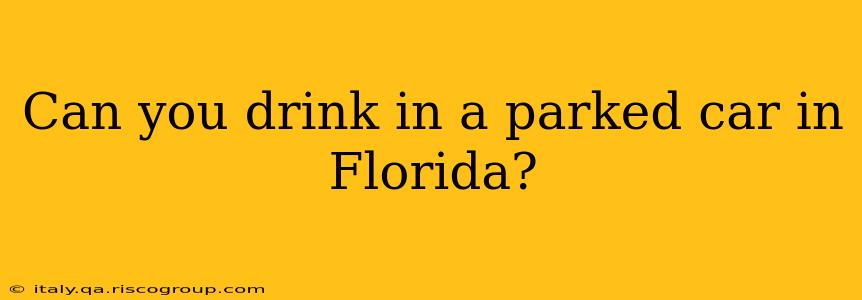Florida's open container laws are a bit more nuanced than a simple "yes" or "no." While it's illegal to consume alcohol in many public places, the specifics regarding drinking in a parked car depend on several factors. This guide clarifies the legalities and helps you avoid potential legal trouble.
Understanding Florida's Open Container Laws
Florida Statute 316.2065 addresses the consumption of alcohol in vehicles. The key phrase here is "any public place." This isn't as straightforward as it might seem. A parked car can be considered a public place depending on its location and circumstances.
What Constitutes "Public"?
The definition of "public" in this context is crucial. A parked car on a public road or in a public parking lot generally falls under this definition. Therefore, consuming alcohol within a vehicle parked in these locations is typically illegal. This applies even if the car's engine is off and the windows are up.
Exceptions and Clarifications
- Private Property: Drinking in a parked car on private property, such as a private parking lot or driveway of a residence, is generally permissible. However, this depends heavily on the specific rules and regulations of the property owner. Always check for signage or inquire with property management to ensure compliance. It's wise to err on the side of caution.
- Designated Driver: While it's not an explicit exception in the law, having a designated driver and remaining parked doesn't automatically exempt you from potential charges. Law enforcement may still cite you if they determine that you are consuming alcohol in a public place.
- "Open Container" Definition: The law doesn't just address drinking but also the presence of open containers. Having an open container of alcohol in your vehicle, even if you aren't currently drinking, can lead to a citation in some contexts, particularly if parked on public property.
Potential Penalties for Violation
Violating Florida's open container laws can result in several penalties, including:
- Fines: Expect to pay a substantial fine, often several hundred dollars.
- Court Costs: Additional court costs can significantly increase the overall penalty.
- License Suspension: In some cases, particularly with repeat offenses or driving under the influence (DUI) related charges, a driver's license suspension could be imposed.
- Points on License: Points might be added to your driving record, potentially affecting your insurance rates.
Avoiding Legal Issues: Best Practices
To avoid potential problems with Florida's open container laws, follow these simple guidelines:
- Only consume alcohol on private property: Stick to private parking lots or driveways where permission is explicitly granted.
- Keep containers closed: Ensure all alcoholic beverage containers are sealed until you arrive at your final destination.
- Never drink and drive: Designated drivers are crucial for safe and legal transportation. This is paramount for avoiding far more serious DUI charges.
- Check local ordinances: Local municipalities may have stricter regulations than the state law, so it is wise to check local ordinances before consuming alcohol in a parked vehicle anywhere.
Disclaimer:
This information is intended for educational purposes only and is not a substitute for legal advice. Consult with a legal professional for advice tailored to your specific situation.
This detailed guide addresses the complexities of Florida’s open container laws, offering clear guidance and practical advice for readers seeking information on drinking in a parked car. The use of subheadings, bold text, and a clear, concise writing style optimizes readability and search engine visibility. This approach ensures the article ranks highly for relevant keywords while providing comprehensive and trustworthy information.

